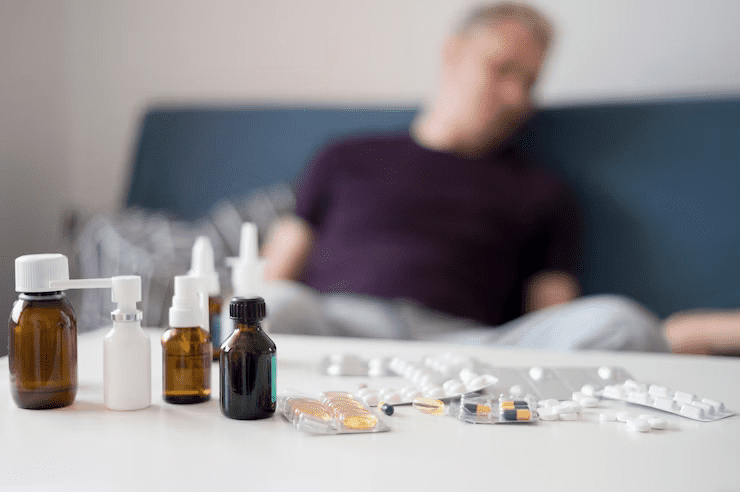Fentanyl is a potent synthetic opioid that is used medically to manage severe pain, particularly in cancer patients or those undergoing surgery. However, it is also a highly addictive drug that can lead to the development of a substance use disorder or an overdose.
Fentanyl addiction can start in various ways, but typically, it begins with legitimate use of the drug for pain management, often after surgery or a medical procedure. Fentanyl is a highly potent opioid that can quickly lead to dependence and addiction, even when taken as prescribed.
Another way that fentanyl addiction can start is through recreational use, often in the form of counterfeit pills or heroin that has been laced with fentanyl. In this case, the individual may not be aware that they are taking fentanyl, and the drug’s potent effects can quickly lead to addiction. If you or a loved one is struggling with fentanyl abuse, help is available. At Gloria Rehab and Detox Center, individuals can get comprehensive fentanyl addiction treatment and work to overcome opioid use disorder.

What is Fentanyl?
Fentanyl misuse occurs when people use it in ways not directed by a healthcare professional, such as crushing and snorting pills or injecting the drug. Some people may also combine fentanyl with other substances like cocaine or heroin to enhance the effects or increase the supply.
Fentanyl is extremely potent, and its effects can be dangerous, even when used as prescribed. When individuals abuse fentanyl, it can lead to a range of harmful consequences, including respiratory depression, overdose, and even death.
It is crucial to use fentanyl only as prescribed and to avoid using it in any other manner or with other substances without consulting a doctor. This is particularly important for individuals with additional risk factors, such as a family history of substance abuse, or those who are taking other drugs, such as morphine, or struggling with alcohol abuse.
Side Effects of Fentanyl Use
Fentanyl use, whether as prescribed or misused, can cause a range of side effects. The most common side effects of fentanyl can include respiratory depression, drowsiness, nausea, vomiting, constipation, and addiction.
Fentanyl drug abuse can also lead to an overdose, which can be life-threatening, especially when used in combination with other drugs or alcohol. It is crucial to seek immediate medical attention if you or someone you know is experiencing any of these side effects after using fentanyl. At Gloria Rehab, we offer safe and effective fentanyl detox services to those ready to end their battle with fentanyl abuse.
Can Fentanyl Use Lead to Addiction?
Regular use of fentanyl can result in physical dependence, tolerance, and addiction. The drug binds to the brain’s opioid receptors, producing feelings of relaxation and euphoria. The brain may become accustomed to fentanyl with consistent use, requiring higher doses to achieve the same effects. This cycle of increased drug use, tolerance, and dependence can ultimately lead to addiction, which is a serious and potentially life-threatening condition.
Seeking professional help is crucial for individuals struggling with fentanyl addiction. The standard approach to treating fentanyl addiction usually involves a combination of medical treatment aided by medication, therapy aimed at modifying behavioral symptoms, treating co-occurring disorders such as alcohol abuse disorder, and guidance provided by a qualified healthcare team. Many people can recover from fentanyl addiction with appropriate treatment and support.
Signs of Fentanyl Addiction
Whether a person is repeatedly using prescription fentanyl or using illegal means to obtain fentanyl, they can develop an addiction to it. Fentanyl addiction signs include increased drug tolerance, withdrawal symptoms, continued use despite negative consequences, and social withdrawal.
Fentanyl use disorder is a severe condition that can have harmful and life-threatening consequences. Seeking professional help is crucial if you or someone you know is experiencing the warning signs of drug addiction. A doctor or addiction specialist can offer support and guidance to overcome substance abuse.
Can You Overdose on Fentanyl?
Overdosing on fentanyl is a possibility, and it can be highly hazardous and potentially lethal. It is a potent opioid that can cause respiratory depression, which can result in reduced breathing rates and oxygen deprivation, leading to severe complications such as coma, brain damage, or death.
The risk of an overdose is higher when fentanyl is taken in higher doses than prescribed or when used recreationally. Additionally, combining it with other substances, such as alcohol or other opioids that also suppress the central nervous system, can result in additive effects, increasing the risk of overdose deaths.
It is crucial to use prescription fentanyl only as directed by a healthcare provider and follow the recommended dosing instructions strictly. If you suspect that you or someone else is experiencing an overdose, seek medical help immediately by calling emergency services or going to the nearest hospital.
How Can a Fentanyl Overdose Be Treated?
Immediate medical help is crucial when an overdose occurs, as this can be life-threatening. Treatment for a fentanyl overdose typically involves administering naloxone, a medication that can reverse the effects of opioid overdose.
After administering naloxone, emergency medical care, such as providing oxygen and administering fluids or medications, may be necessary to support the person’s breathing and heart function. Hospitalization and monitoring in a specialized unit, such as the ICU, may be required to ensure the person’s recovery and prevent any further complications.

How Is Fentanyl Abuse Treated?
To treat fentanyl addiction, a combination of methods are used. The treatment approach may vary depending on the individual’s needs and circumstances. The following are some common methods used in fentanyl addiction treatment:
Detoxification
The initial stage of treating fentanyl abuse involves discontinuing the use of the drug and addressing fentanyl withdrawal symptoms through inpatient or outpatient care. Detox can be incredibly uncomfortable, and individuals may struggle with the following symptoms of fentanyl withdrawal:
- Nausea or vomiting
- Achy muscles and bones
- Cold flashes
- Goosebumps
- Uncontrollable leg movements
- Diarrhea
- Insomnia
- Severe cravings
- Poor coordination
Medication-assisted Treatment (MAT)
Medications such as buprenorphine, methadone, or naltrexone can be used to reduce cravings, manage withdrawal, and prevent relapse. Fentanyl users who are at greater risk of withdrawal symptoms may benefit from medication-assisted treatment.
Behavioral Therapy
This is used to address the underlying causes of addiction, identify triggers, and develop coping mechanisms to prevent relapse. Common forms of behavioral therapy include cognitive-behavioral therapy (CBT), contingency management (CM), and motivational interviewing (MI).
Support Programs
Ongoing support is important for long-term recovery from fentanyl abuse. The support may include group therapy, individual counseling, and 12-step programs. Individuals who abuse fentanyl may find support groups such as Narcotics Anonymous (NA) helpful – the meetings (which can be located using the NA website) are community-based and provide support and accountability from individuals who have gone through similar struggles and understand the importance of each individual’s recovery journey.
Treating Co-Occurring Disorders
In fentanyl addiction treatment, it is crucial to address any underlying mental health conditions, such as depression or anxiety. Although it may be difficult, recovering from fentanyl addiction requires sustained effort and time. Treating any mental illness at the same time as substance abuse can help individuals work through any root causes that may be contributing to their drug abuse while also providing them with the tools and mental health support needed for long-term recovery.
Get Started with Fentanyl Addiction Treatment
It is essential to seek help for fentanyl addiction for several reasons. Firstly, fentanyl is a powerful synthetic opioid that is very potent and can lead to overdose and death, so seeking help can provide the necessary medical care and support to manage the physical and psychological dependence on the drug and prevent further harm. Additionally, fentanyl addiction can cause health problems, affect relationships and daily life, and be challenging to overcome alone.
For individuals who may need to go through a medical detox program to address the more severe withdrawal symptoms of fentanyl addiction, rehab centers provide supervised medical intervention to help mitigate the risk factors and adverse effects that may occur when individuals stop taking fentanyl. Professional treatment also provides individuals with the therapeutic support needed to overcome substance abuse, including experiential therapies, group therapy, sessions with family members, and aftercare support.
If you or a loved one is ready to seek professional treatment for fentanyl addiction, get in touch with our compassionate, dedicated staff. You can call us at (818) 659-9444 or reach out to us via our secure online form with any questions about how our addiction treatment program works.

